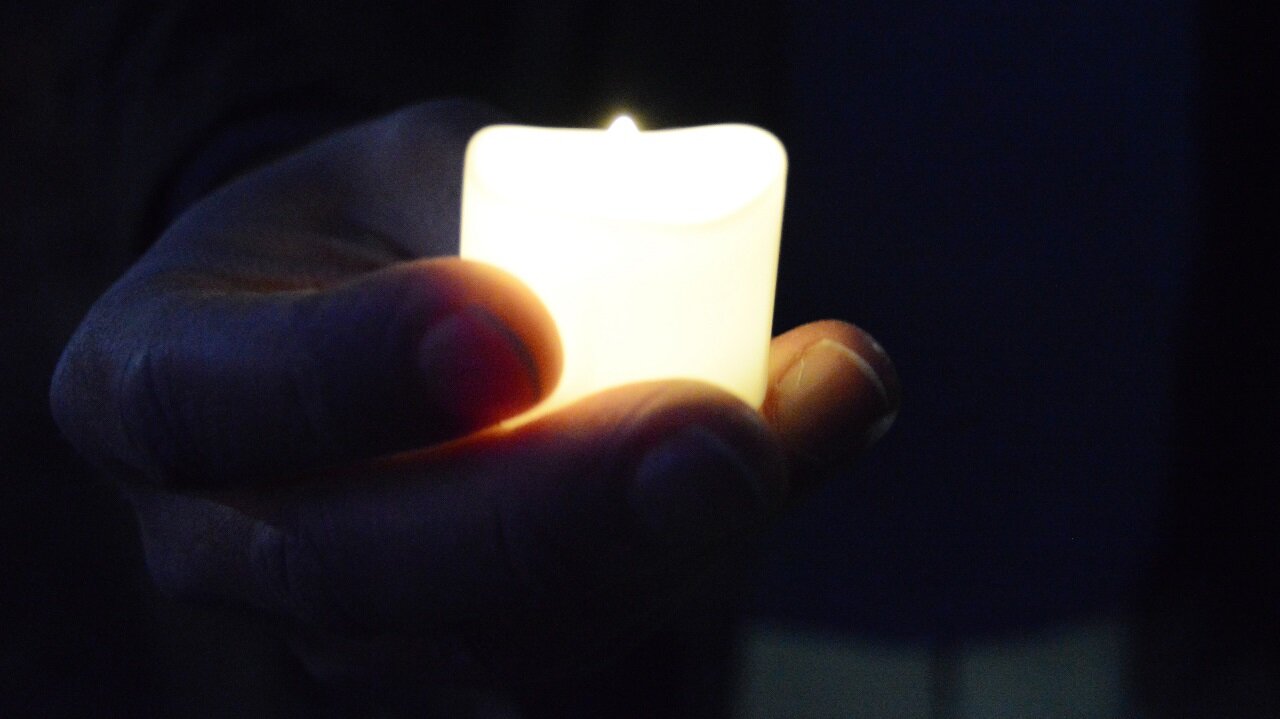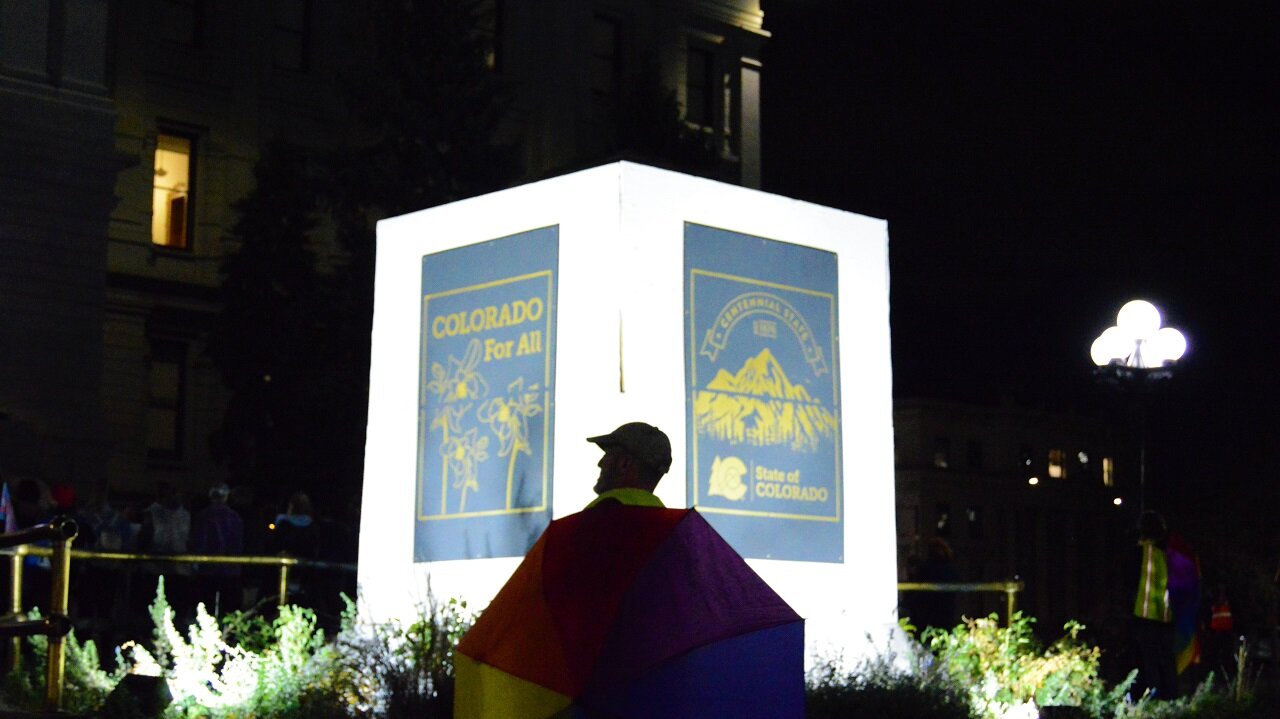This Transgender Day of Remembrance, advocates feel mixed emotions

DENVER — Dozens of feet hit the pavement of downtown Denver to call attention to the lives lost in 2021 to anti-transgender violence. Advocates rallied and marched to the Colorado Capitol building ahead of Transgender Day of Remembrance on November 20.
Gwendolyn Ann Smith, a transgender advocate, started the national day of recognition in 1999 as a vigil to honor the memory of Rita Hester, a transgender woman who was killed in 1998 and misgendered by media. Transgender Day of Remembrance events include reading the names of those killed that year.
As of today, the Human Rights Campaign reports 46 violent deaths in 2021 of transgender and gender non-conforming people. That makes this year the deadliest year since the Human Rights Campaign started keeping track in 2013.
“The rhetoric and stigma aimed by anti-equality political leaders and public figures at transgender and non-binary people have led to an unprecedented level of horrific violence against our transgender community. We must fight for change,” said Joni Madison, Interim President of the Human Rights Campaign.
More anti-transgender bills were passed in 2021 than in any other year; nine of them in various states target transgender youth participation in sports and another limits adolescent access to gender-affirming medical care. Advocates have warned those bills could lead to more attacks on transgender people.
Colorado was not one of those states. This year, Colorado became the first state to include gender-affirming treatments in essential health benefits. This applies to those who are enrolled in individual or small group plans. People enrolled in Colorado's Medicaid plan already have coverage for transition-related services.
In one advocate's eyes, Colorado has always been a more welcoming place.
“Culturally, we are more openly talking about transgender and gender diverse experience than we have been at any point in my lifetime,” said Sable Schultz. She is the manager of transgender services for The Center on Colfax, which is an LGBTQ+ community center in Denver. It also helped organize the rally and march to Colorado’s Capitol building on Friday, November 19.
Schultz, in her position with the Center, oversees support groups, helps connect people to resources and information, and works with other organizations to provide training and guidance. She said this Transgender Day of Remembrance comes with a lot of complicated and mixed emotions.
“If I don't look at the specific numbers right around those who have been killed or those who have, whose lives have been lost due to transphobic violence overall, culturally, I'm seeing a lot of hope, right? I'm seeing a lot more representation in media. I'm seeing transgender experience more openly talked about and just more openly accepted. So there's a lot of hope there,” Schultz explained.
She further talked about why 2021 may have included such a high number of deaths from transphobic violence. She said in so many years prior, media or even police did not properly report on attacks against transgender people.
“I have no doubts that we have seen that there probably have been this many or more deaths in prior years, but they may not have been reported as such, or they may not have been reported at all,” said Schultz.
On top of those feelings, she said she also has another complicated feeling around Transgender Day of Remembrance: She said this day only looks at one aspect of transgender deaths—people who have lost their lives to direct violence.
“We often overlook people who have lost their lives because of inadequate access to behavioral health supports or inadequate access to health care, or the number of people who don't have adequate housing and maybe had their lives cut short because of having to live on the streets,” explained Schultz.

The Human Rights Campaign also keeps track of other elements of the person’s identity who was killed, including race. This year, out of those 46 victims, 29 were Black and eight were Latinx.
"I think it's really important to recognize the racialized aspect of much of the violence that targets trans folks and especially trans women, right?” Schultz said. “The majority of people that we lose each year are Black trans women. Those are the majority of people who have been targeted by violence. And it's like this upwelling, right? This intersection of transphobia and misogyny and racism are all coming to target a lot of these individuals.”
On top of that, the intersection of race, age, class and identity can also have a severe impact on mental health. The Trevor Project’s National Survey on LGBTQ Youth Mental Health 2021 found 52 percent of Native/Indigenous LGBTQ youth, 47 percent of Black youth and 43 percent of Latinx youth have contemplated suicide. That is compared to 39 percent of white youth. Mental health is critical for the physical well-being of anyone, and as Schultz said, the two are often connected and highly needed.
“[We should be] looking for ways that we can expand that health care coverage to make it more accessible to everybody, like everybody in Colorado needs better healthcare coverage. Right? So looking for ways that we can expand that; looking for ways that we can expand affordable housing is a huge issue. I feel that's one of the number one issues that my community faces at times is the ability to find just a home that they can afford to live in,” said Shultz.
The number of people experiencing homelessness in Denver has dramatically increased during the pandemic. A point-in-time survey found the number of people who were without a home for the first time doubled in one year. On top of that, the National Center for Transgender Equality reports one in five transgender individuals have experienced homelessness at some point in their lives. These are the type of issues Schultz said are next on the table toward gaining equality and acceptance.
“It's no longer a matter of having to fight for recognition or acceptance as much as it is...how can we channel our energy and to create more positive influence and change?” Schultz explained.

So what is Schutlz's message to us on the individual level?
For allies: “I think or allies who may be looking for 'What is something I can do, like on a daily basis or a regular basis,' right? I think...sharing your pronouns is a huge, powerful piece, right? In doing that, it opens up the conversation for everybody else to be able to share their pronouns and where they're at remembering that if you're not sure that 'they, them' pronouns are perfectly fine.”
For transgender and gender diverse people: “For trans and gender diverse folks who are coming out, I want to honor that it may feel heavy right now, like there may be a lot going on and it may feel overwhelming. This is just one day and just keep moving forward. And there are organizations like The Center on Colfax, like the Transgender Center of the Rockies that have supports for you.”
Overall, despite being a somber occasion for Transgender Day of Remembrance, at 50 years old, Schultz sees this time in our society as a hopeful one.
“I have a lot of hope for sort of these generations coming up and coming into power and coming into their own awareness. Like the conversations that are having are just are phenomenal. They're fantastic,” said Schultz “And they're kind of a relief in a way, because when I see folks [from] these next generations coming in and being upfront and having these conversations around the importance of accepting gender diversity and racial diversity and disability diversity, like right out of the gate, I'm like, ‘Oh my gosh, I don't have to do that fight anymore.’”
Resources:
- One Colorado Resources: 303-396-6170
- The Center on Colfax Resources: 303-733-77433
- Transgender Center of the Rockies Resources: 303-761-0220
- If you have an immediate mental health crisis, please call Colorado Crisis Services at 1-844-493-8255 or text TALK to 38255. Or call the National Suicide Prevention Lifeline at 1-800-273-8255. You can also chat with the Lifeline.
Amanda Horvath is a multimedia producer with Rocky Mountain PBS. You can reach her at amandahorvath@rmpbs.org.